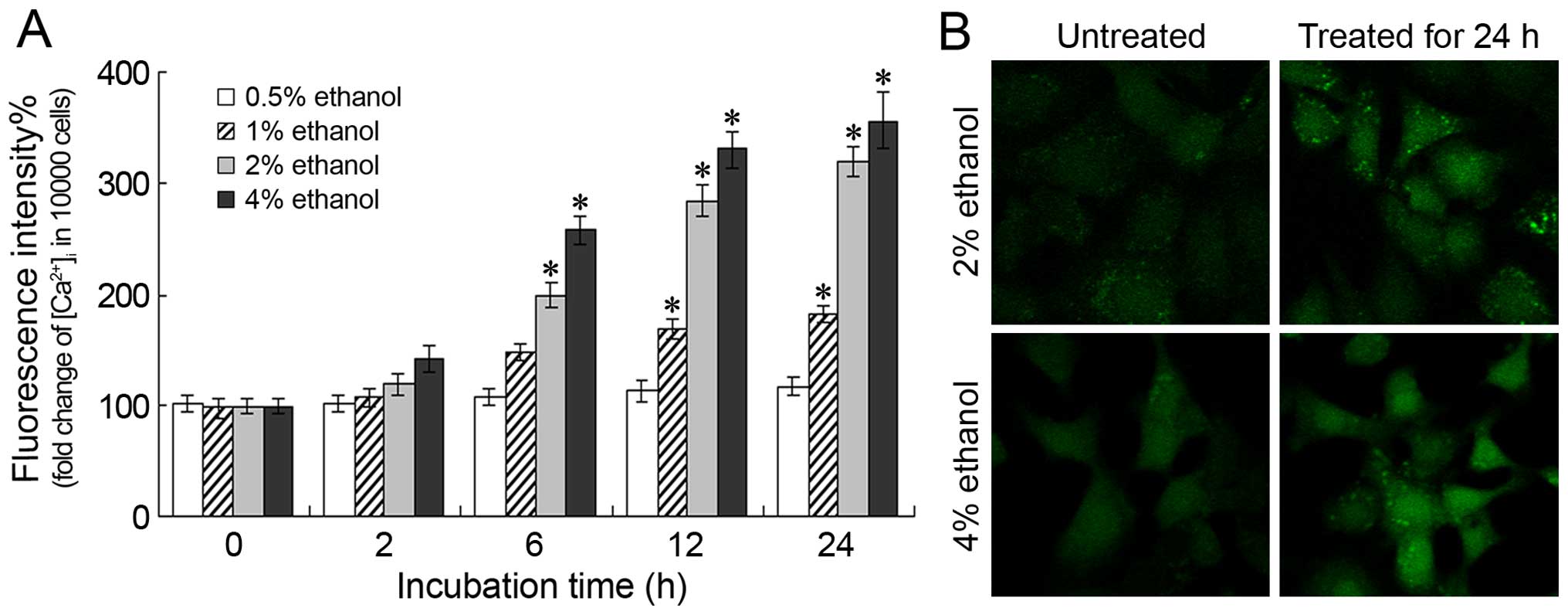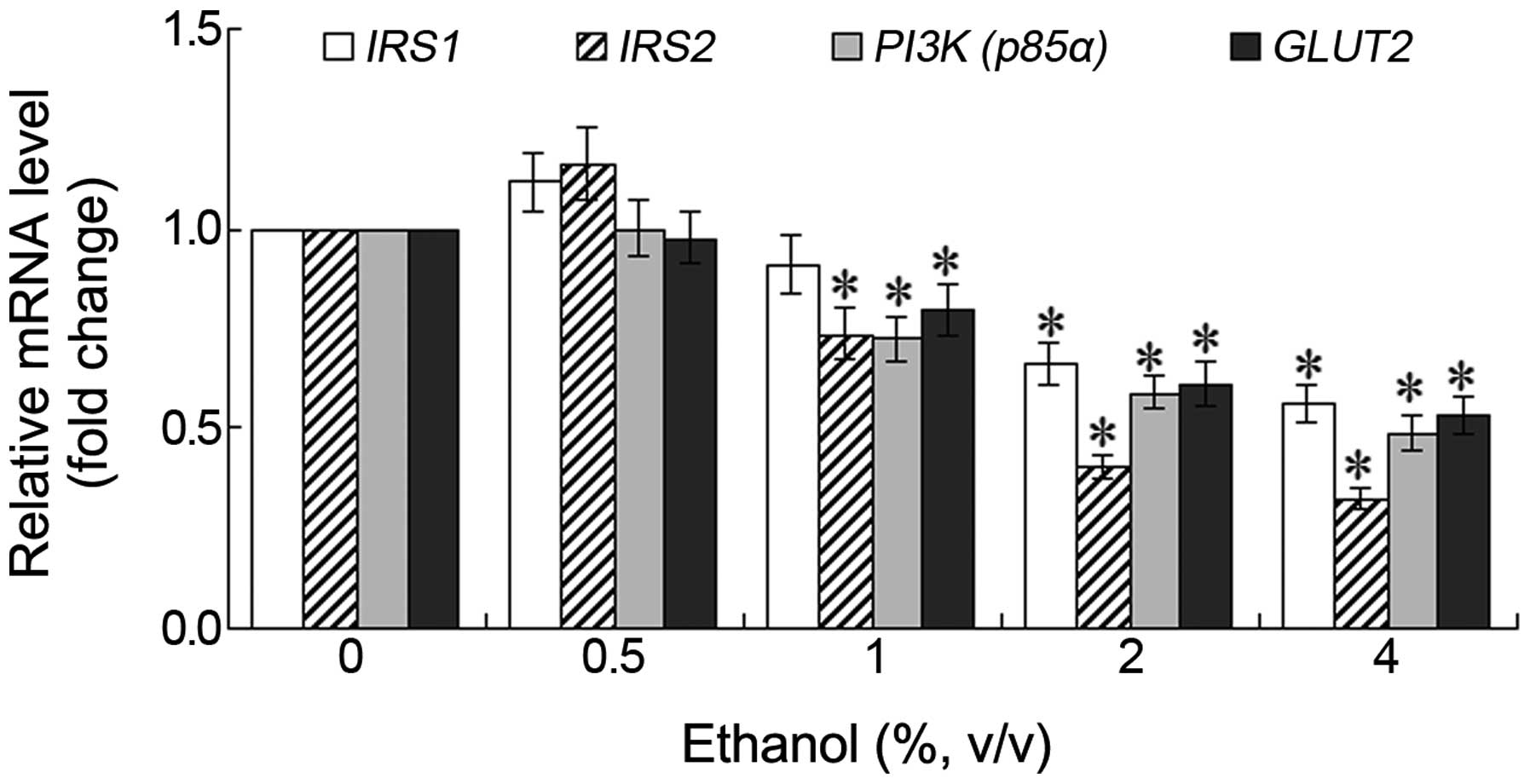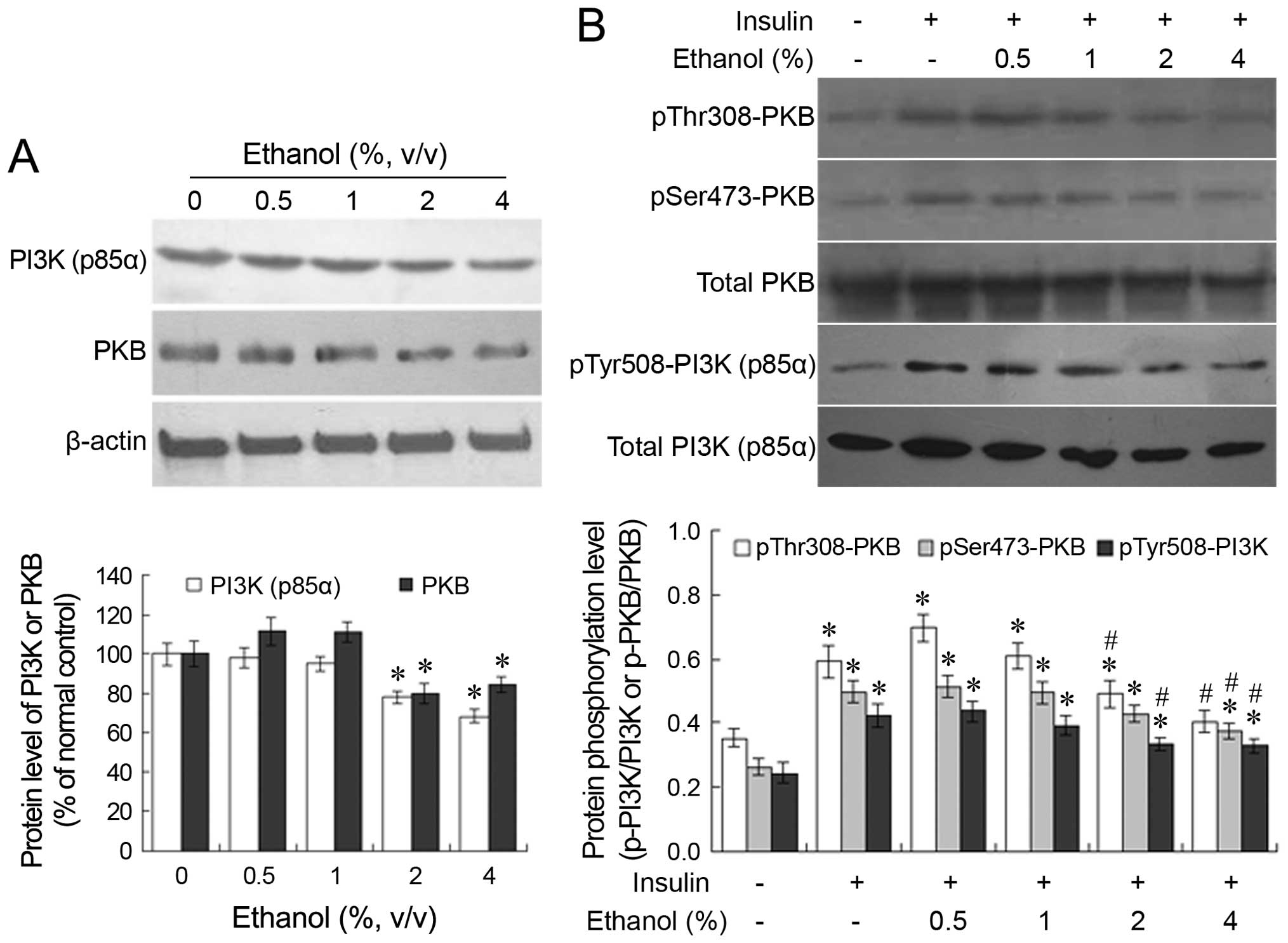|
1
|
Wannamethee SG, Shaper AG, Perry IJ and
Alberti KG: Alcohol consumption and the incidence of type II
diabetes. J Epidemiol Community Health. 56:542–548. 2002.
View Article : Google Scholar : PubMed/NCBI
|
|
2
|
Pietraszek A, Gregersen S and Hermansen K:
Alcohol and type 2 diabetes. A review. Nutr Metab Cardiovasc Dis.
20:366–375. 2010. View Article : Google Scholar : PubMed/NCBI
|
|
3
|
Cullmann M, Hilding A and Östenson CG:
Alcohol consumption and risk of pre-diabetes and type 2 diabetes
development in a Swedish population. Diabet Med. 29:441–452. 2012.
View Article : Google Scholar
|
|
4
|
Fan AZ, Russell M, Naimi T, Li Y, Liao Y,
Jiles R and Mokdad AH: Patterns of alcohol consumption and the
metabolic syndrome. J Clin Endocrinol Metab. 93:3833–3838. 2008.
View Article : Google Scholar : PubMed/NCBI
|
|
5
|
Petersen KF and Shulman GI: Etiology of
insulin resistance. Am J Med. 119(Suppl 1): S10–S16. 2006.
View Article : Google Scholar : PubMed/NCBI
|
|
6
|
Ismail-Beigi F: Pathogenesis and glycemic
management of type 2 diabetes mellitus: a physiological approach.
Arch Iran Med. 15:239–246. 2012.PubMed/NCBI
|
|
7
|
Bechmann LP, Hannivoort RA, Gerken G,
Hotamisligil GS, Trauner M and Canbay A: The interaction of hepatic
lipid and glucose metabolism in liver diseases. J Hepatol.
56:952–964. 2012. View Article : Google Scholar
|
|
8
|
Saltiel AR and Kahn CR: Insulin signalling
and the regulation of glucose and lipid metabolism. Nature.
414:799–806. 2001. View
Article : Google Scholar : PubMed/NCBI
|
|
9
|
Liu H, Jia X, Luo Z, Guan H, Jiang H, Li X
and Yan M: Inhibition of store-operated Ca2+ channels
prevent ethanol-induced intracellular Ca2+ increase and
cell injury in a human hepatoma cell line. Toxicol Lett.
208:254–261. 2012. View Article : Google Scholar
|
|
10
|
Vagts AJ, He DY, Yaka R and Ron D:
Cellular adaptation to chronic ethanol results in altered
compartmentalization and function of the scaffolding protein RACK1.
Alcohol Clin Exp Res. 27:1599–1605. 2003. View Article : Google Scholar : PubMed/NCBI
|
|
11
|
Shih CL, Chi SI, Chiu TH, Sun GY and Lin
TN: Ethanol effects on nitric oxide production in cerebral pial
cultures. Alcohol Clin Exp Res. 25:612–618. 2001. View Article : Google Scholar : PubMed/NCBI
|
|
12
|
Kim E, Seok HH, Lee SY, Lee DR, Moon J,
Yoon TK, Lee WS and Lee KA: Correlation between expression of
glucose transporters in granulosa cells and oocyte quality in women
with polycystic ovary syndrome. Endocrinol Metab (Seoul). 29:40–47.
2014. View Article : Google Scholar
|
|
13
|
Livak KJ and Schmittgen TD: Analysis of
relative gene expression data using real-time quantitative PCR and
the 2(−Delta Delta C(T)) method. Methods. 25:402–408. 2001.
View Article : Google Scholar
|
|
14
|
Thiele TE: Insulin resistance from binge
drinking: It's all in your head. Sci Transl Med. 5:170fs32013.
View Article : Google Scholar : PubMed/NCBI
|
|
15
|
Tang YL, Xiang XJ, Wang XY, Cubells JF,
Babor TF and Hao W: Alcohol and alcohol-related harm in China:
policy changes needed. Bull World Health Organ. 91:270–276. 2013.
View Article : Google Scholar : PubMed/NCBI
|
|
16
|
Carlsson S, Hammar N, Grill V and Kaprio
J: Alcohol consumption and the incidence of type 2 diabetes: a
20-year follow-up of the Finnish twin cohort study. Diabetes Care.
26:2785–2790. 2003. View Article : Google Scholar : PubMed/NCBI
|
|
17
|
Lee K: Gender-specific relationships
between alcohol drinking patterns and metabolic syndrome: the Korea
National Health and Nutrition Examination Survey 2008. Public
Health Nutr. 15:1917–1924. 2012. View Article : Google Scholar : PubMed/NCBI
|
|
18
|
Onishi Y, Honda M, Ogihara T, Sakoda H,
Anai M, Fujishiro M, Ono H, Shojima N, Fukushima Y, Inukai K, et
al: Ethanol feeding induces insulin resistance with enhanced PI
3-kinase activation. Biochem Biophys Res Commun. 303:788–794. 2003.
View Article : Google Scholar : PubMed/NCBI
|
|
19
|
Wilkes JJ, DeForrest LL and Nagy LE:
Chronic ethanol feeding in a high-fat diet decreases
insulin-stimulated glucose transport in rat adipocytes. Am J
Physiol. 271:E477–E484. 1996.PubMed/NCBI
|
|
20
|
Xu D, Dhillon AS, Davey CG, Fournier PA
and Palmer TN: Alcohol and glucose metabolism in skeletal muscles
in the rat. Addict Biol. 1:71–83. 1996. View Article : Google Scholar : PubMed/NCBI
|
|
21
|
Guo S: Insulin signaling, resistance, and
the metabolic syndrome: insights from mouse models into disease
mechanisms. J Endocrinol. 220:T1–T23. 2014. View Article : Google Scholar
|
|
22
|
White MF: Insulin signaling in health and
disease. Science. 302:1710–1711. 2003. View Article : Google Scholar : PubMed/NCBI
|
|
23
|
Kadowaki T: Insights into insulin
resistance and type 2 diabetes from knockout mouse models. J Clin
Invest. 106:459–465. 2000. View Article : Google Scholar : PubMed/NCBI
|
|
24
|
Withers DJ, Gutierrez JS, Towery H, Burks
DJ, Ren JM, Previs S, Zhang Y, Bernal D, Pons S, Shulman GI, et al:
Disruption of IRS-2 causes type 2 diabetes in mice. Nature.
391:900–904. 1998. View
Article : Google Scholar : PubMed/NCBI
|
|
25
|
Kido Y, Burks DJ, Withers D, Bruning JC,
Kahn CR, White MF and Accili D: Tissue-specific insulin resistance
in mice with mutations in the insulin receptor, IRS-1, and IRS-2. J
Clin Invest. 105:199–205. 2000. View Article : Google Scholar : PubMed/NCBI
|
|
26
|
Benito M: Tissue specificity on insulin
action and resistance: past to recent mechanisms. Acta Physiol
(Oxf). 201:297–312. 2011. View Article : Google Scholar
|
|
27
|
Pagliassotti MJ, Kang J, Thresher JS, Sung
CK and Bizeau ME: Elevated basal PI 3-kinase activity and reduced
insulin signaling in sucrose-induced hepatic insulin resistance. Am
J Physiol Endocrinol Metab. 282:E170–E176. 2002.
|
|
28
|
Nevado C, Valverde AM and Benito M: Role
of insulin receptor in the regulation of glucose uptake in neonatal
hepatocytes. Endocrinology. 147:3709–3718. 2006. View Article : Google Scholar : PubMed/NCBI
|
|
29
|
Karim S, Adams DH and Lalor PF: Hepatic
expression and cellular distribution of the glucose transporter
family. World J Gastroenterol. 18:6771–6781. 2012. View Article : Google Scholar : PubMed/NCBI
|
|
30
|
Cui RB, Kan BT, Sun XM, Luo Z, Guo R, Guo
XL and Yan M: Role of store-operated Ca2+ channels in
primary hepatocytes under conditions of calcium overload and
ethanol-induced injury. Zhonghua Gan Zang Bing Za Zhi. 21:860–864.
2013.In Chinese. PubMed/NCBI
|
|
31
|
Caro AA and Cederbaum AI: Role of calcium
and calcium-activated proteases in CYP2E1-dependent toxicity in
HEPG2 cells. J Biol Chem. 277:104–113. 2002. View Article : Google Scholar
|




















